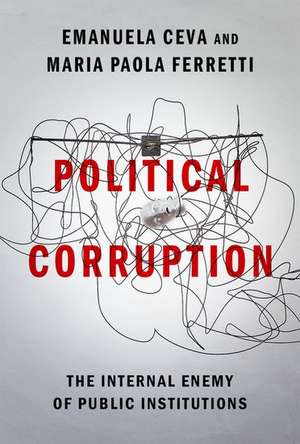Political Corruption: The Internal Enemy of Public Institutions
Autor Emanuela Ceva, Maria Paola Ferrettien Limba Engleză Hardback – 28 sep 2021
Preț: 163.17 lei
Preț vechi: 188.39 lei
-13% Nou
Puncte Express: 245
Preț estimativ în valută:
31.22€ • 32.75$ • 25.99£
31.22€ • 32.75$ • 25.99£
Carte disponibilă
Livrare economică 28 februarie-06 martie
Livrare express 25 februarie-01 martie pentru 49.15 lei
Preluare comenzi: 021 569.72.76
Specificații
ISBN-13: 9780197567869
ISBN-10: 019756786X
Pagini: 232
Dimensiuni: 211 x 147 x 23 mm
Greutate: 0.36 kg
Editura: Oxford University Press
Colecția OUP USA
Locul publicării:New York, United States
ISBN-10: 019756786X
Pagini: 232
Dimensiuni: 211 x 147 x 23 mm
Greutate: 0.36 kg
Editura: Oxford University Press
Colecția OUP USA
Locul publicării:New York, United States
Recenzii
This timely, wonderful book illuminates the many faces of political corruption, from the 'bad apple' to the dysfunctional institution, through the unified framework of a public ethics of office. Emanuela Ceva and Maria Paola Ferretti's incisive philosophical analysis of political corruption as a deficit of office accountability reconciles the phenomenon's individual and institutional dimensions. The authors elucidate the deontic wrong of political corruption in terms of an 'interactive injustice,' which consists of officeholders' violation of their duty of office accountability, and identify the practice of answerability as the key to fostering an organizational culture of anticorruption. Political Corruption's deeply significant contribution to political theory and public ethics is needed now more than ever.
Political Corruption: The Internal Enemy of Public Institutions offers an original account of political corruption which aims to understand how political corruption works and what is wrong with it. Restoring office accountability serves as a key focus which can help reorient anti-corruption efforts. This impressive work is essential reading for theorists interested in understanding why political corruption is problematic and how we might aim to combat it.
In this highly original study of political corruption, Ceva and Ferretti ask us to reflect on the wrong of corruption by looking beyond both individualist and structural accounts of institutional responsibility. Their analysis of corruption as an unaccountable use of the power conferred by holding public office is a crucial inter-disciplinary intervention. The book is essential reading for both an adequate diagnosis of the phenomenon, and identifying appropriate responses to it.
Ceva and Ferretti have written an important book on how we should understand political corruption.
Ceva and Ferretti provide rich, comprehensive, and thought-provoking answers to the question of what political corruption-understood as corruption that occurs in public institutions-is and when and why it is morally wrong.
Ceva and Ferretti's book offers an innovative account of political corruption as "a form of unaccountable use of entrusted power".
Ceva and Feretti's new book is a careful, well-organised exposition of a rigorous and wide-ranging new theory of political corruption. It deserves careful attention from other corruption theorists.
Political Corruption: The Internal Enemy of Public Institutions offers an original account of political corruption which aims to understand how political corruption works and what is wrong with it. Restoring office accountability serves as a key focus which can help reorient anti-corruption efforts. This impressive work is essential reading for theorists interested in understanding why political corruption is problematic and how we might aim to combat it.
In this highly original study of political corruption, Ceva and Ferretti ask us to reflect on the wrong of corruption by looking beyond both individualist and structural accounts of institutional responsibility. Their analysis of corruption as an unaccountable use of the power conferred by holding public office is a crucial inter-disciplinary intervention. The book is essential reading for both an adequate diagnosis of the phenomenon, and identifying appropriate responses to it.
Ceva and Ferretti have written an important book on how we should understand political corruption.
Ceva and Ferretti provide rich, comprehensive, and thought-provoking answers to the question of what political corruption-understood as corruption that occurs in public institutions-is and when and why it is morally wrong.
Ceva and Ferretti's book offers an innovative account of political corruption as "a form of unaccountable use of entrusted power".
Ceva and Feretti's new book is a careful, well-organised exposition of a rigorous and wide-ranging new theory of political corruption. It deserves careful attention from other corruption theorists.
Notă biografică
Emanuela Ceva is Professor of Political Theory at the University of Geneva. She has held fellowships at the universities of Oxford, Hitotsubashi (Tokyo), St Andrews, Montréal, Hamburg, Harvard, and KU Leuven. In 2018, she was awarded a Fulbright Research Scholarship in Philosophy. She works primarily on the normative theory of institutions with a focus on conflict and justice, democracy, and corruption. She is the author of Interactive Justice (Routledge, 2016), co-author of Is Whistleblowing a Duty? (Polity, 2018), and has published articles in such journals as The Journal of Political Philosophy, Social Philosophy & Policy, Politics, Philosophy & Economics, and Philosophy Compass.Maria Paola Ferretti is Professor ad interim of Political Theory and Philosophy and a member of the Normative Orders Research Center at the Goethe University of Frankfurt am Main. Her research interests include contemporary liberalism, democratic participation, and the ethics of public policy. She is the author of The Public Perspective: Public Justification and the Ethics of Belief (Rowman and Littlefield).
